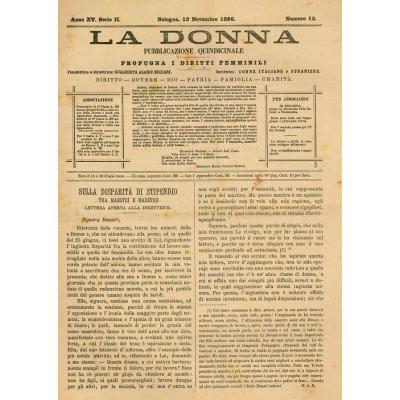Scheda
Gualberta Alaide Beccari was born in Padova in 1842; at a young age she followed her father, a passionate Mazzinian patriot, to exile in Torino, where she came into contact with the republican milieu, the primary source of her education and of her desire to promote a new education for woman, mainly through reading. Gualberta’s interest in writing and her political committment emerged from her collaboration on a commemorative book in honor of Adelaide Carioli and her children, edited together with Francesca Zambusi from Lago and with the idea to create a series dedicated to Italian patriots. In 1868 she founded in Padova the magazine "La Donna" (The woman), which she wanted to be "an authority of female interests (…) only written by women" (G.A. Beccari, Il nostro ottavo anno di vita, 'La Donna' 10 May 1875, n. 255). The principle aim of the magazine was to inform and educate women about all subjects: political, literary, scientific and artistic; the articles were not limited to the theoretical sphere but provided practical examples relating to school and to the working world, and with a look into the international sphere of female thought.
After briefly staying in Venice, in 1878 Beccari moved to Bologna with her publication of the magazine "La Donna". Following the publication’s move to Bologna the magazine’s commitment to politics was much more prominent: the central themes were Mazzinian-inspired workers' societies activities and consequently the attention to the struggles and demands of the working world. Surrounding Beccari and the magazine was a dense web of relationships and correspondences that created a network of solidarity and equality crossing over the pages of the magazine, and during their periodical meetings in Beccari’s house, intellectual partnerships were forged. The meetings for the magazine "La Donna" became occassions for women to gather, not only inside the confines of a salon, but increasingly open to new experiences, discussions and meetings. Some of the magazine’s collaborators included Anna Maria Mozzoni; Sarina Nathan; Luisa Tosko; Giorgina Saffi; Giulia Cavallari Cantalamessa; Fanny Lewald; Ernesta Napollon, all of these women were committed to major feminist campaigns of the 19th century fighting for women’s civil and political rights. Gualberta was also a novelist and comedian, sometimes she would publish under the pseudonym of Flaviana Flaviani. She died, after an illness, in Bologna in September of 1906.
Translation from italian language by Holly Bean.







